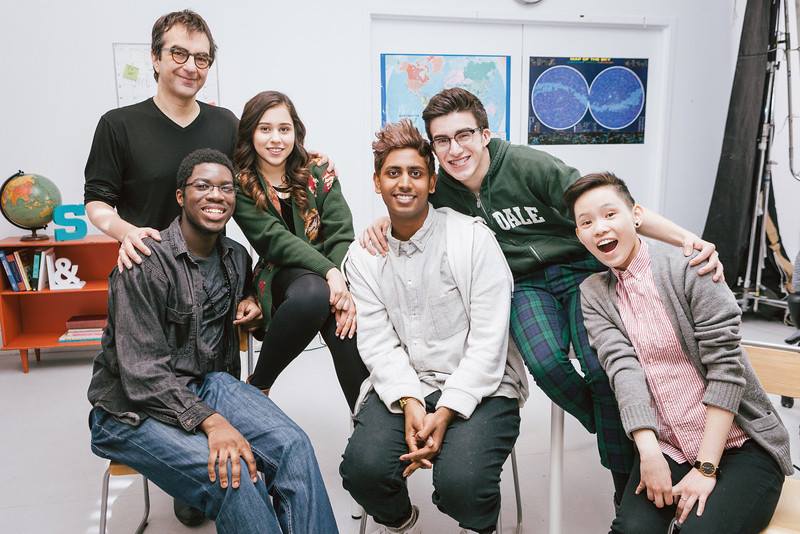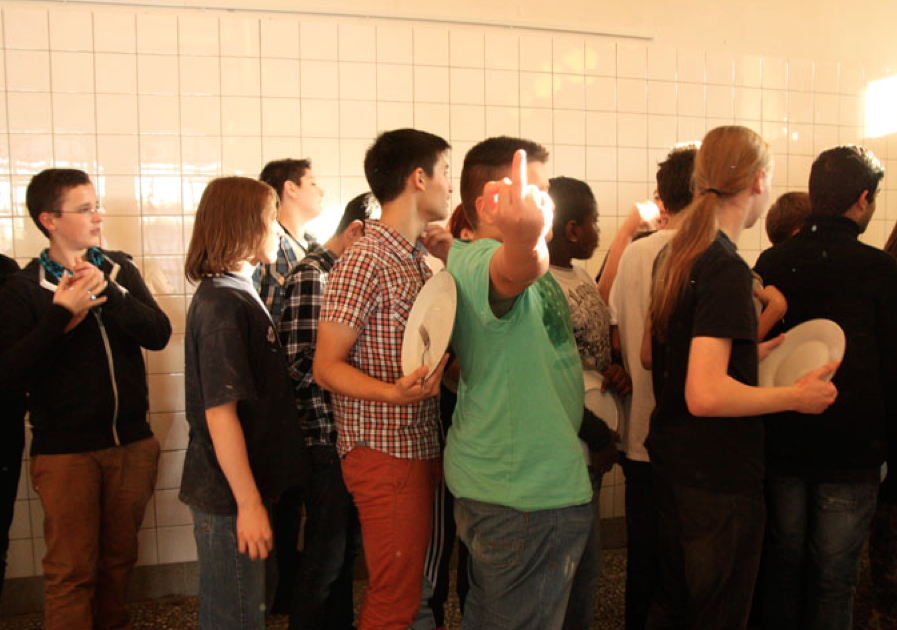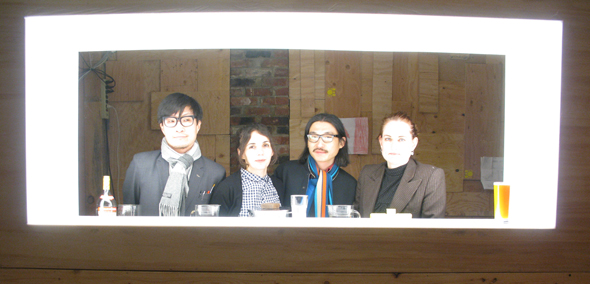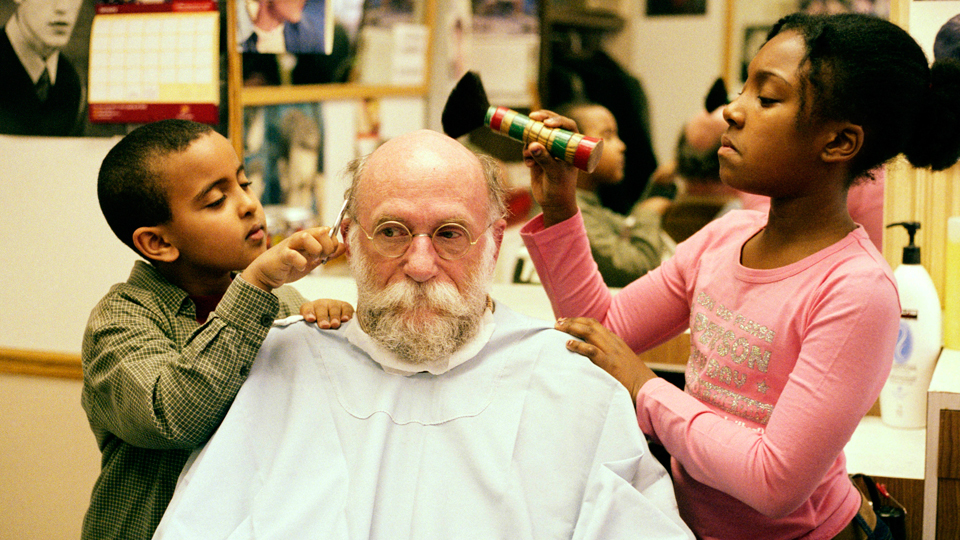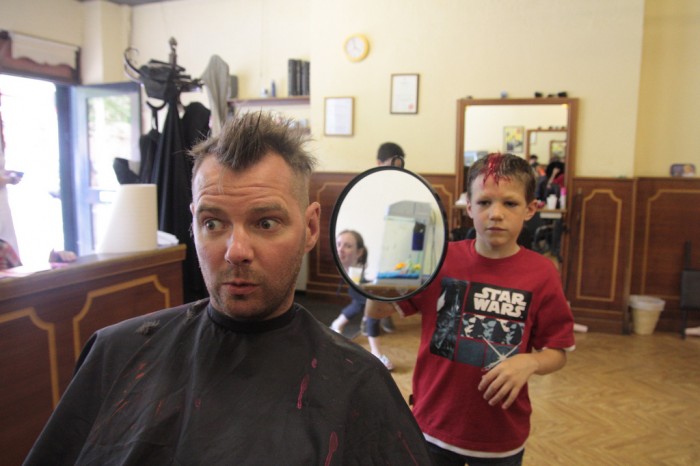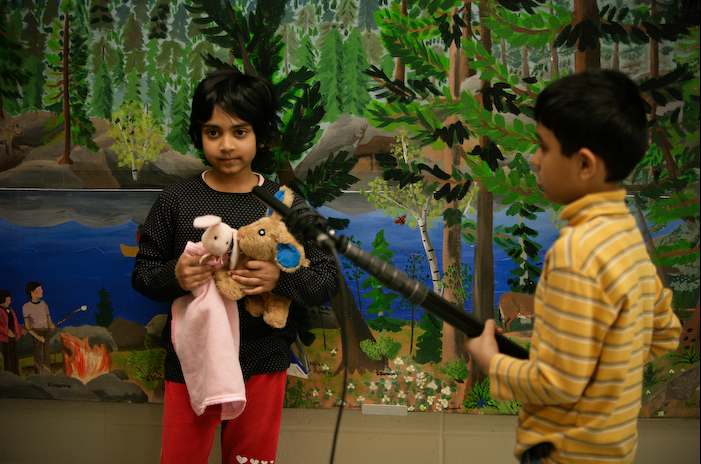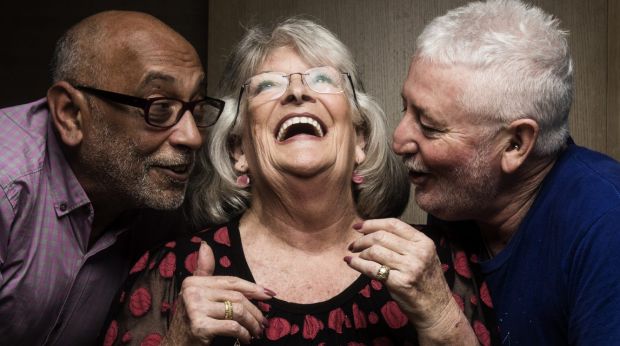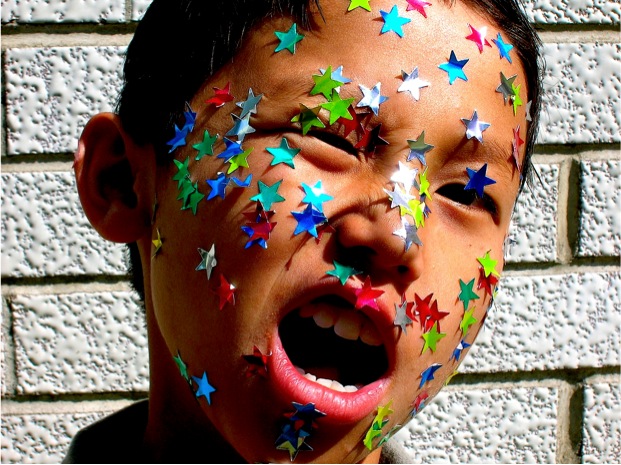Between Haircuts by Children and The Best Sex I Ever Had: an interview with Darren O’Donnell (2011)
Mike: Your apartment is smothered with sheets of paper that read: Health. Health. Health. What’s that about?
Darren: It’s top secret. It was a project I did with these 14-year-old kids from Parkdale. Last Christmas I wanted to play with the talk show format with the kids and shoot it here in my apartment. I proposed to bring in a bunch of adults over Christmas, what do you guys want to talk to them about? That continued a conversation we were having when I asked the kids what concerned them. Their conclusion was that backstabbing bitches concern them, gossiping internecine bullshit concerns them, so the conversation picked up from there. How can we make a talk show about that? Our conversation quickly turned towards relationships, romance and sexuality, so they drafted questions while I very deliberately laid back. I did not say no to any of their proposals. It finally wound up in a show called Health where they queried adults about sex. People like Ulysses Castellanos, Sheila Heti and Amish Morell were involved. It wasn’t very good because everyone was asked the same questions. More or less. But they’re getting more comfortable doing it. We’re trying to develop it further now.
Mike: Where are the kids from?
Darren: I met them all at Parkdale Public School a bunch of years ago, when our theatre company (Mammalian Diving Reflex) was the company in residence. Since then we haven’t continued to work with the school, but I’m friends with these kids on Facebook. Sanjay got in touch last summer, I hardly knew him, but he wanted to know if I was aware of any singing competitions — Canadian Idol, that kind of stuff. I said I didn’t know, but if you want to make a video we could do something. So I hooked up with some of his friends, and the day before we started one of the kids I’d worked with before was waiting for a bus just outside my building, so I invited him along too. It’s been running for a year now.
The Metcalf Foundation is funding a three-year youth wing that will create an institutional infrastructure for our youth work. We also got some money from the province to do a learn-how-to-be-a-producer residency at the Gladstone Hotel, it’s called Producers of Parkdale. Ten kids will spend a year at the hotel, taking workshops from people who tackle different aspects of event production, from marketing to production management. Then the kids will partner with someone from the hotel, and later they’ll shadow an organization that is renting the Gladstone to do an event. These associations will culminate with the kids running their own office in July, and producing their own weekend festival in August 2012.
We’re trying to grow the numbers, but the kids are really selfish because they really love the vibe that they have as a group — you remember what it was like when you were a kid — and they don’t want us to fuck with it. They don’t want us to bring in other kids who they’re competitive with, or who might outshine them, or have more charisma or confidence. So we’re careful, we want them to do the recruiting, but what they’re saying is that they don’t want to draw from their neighbourhood, they want us to get kids from across the city who won’t bring the history of a shared school. But I want to work with Parkdale kids for the first year, so they might just have to have to suck it up. They’re so territorial about it. I’m really generous with them in some ways, I mean, it’s all to benefit me ultimately, but I spend a lot of money on food and workshops and dance lessons, stuff like that. It’s all towards them taking over the company, that’s the public thing we’re saying. We would eventually like the company to be in the hands of the cohort of kids we started working with in 2005. It’s a conceptual, artistic joke goal I have, but I’m also serious about it. I’ll be dead anyway, but I just want to make sure that there’s a cohort of kids who will take over the company when they’re in their late 20s. We’ve been training them since they were 10.
Mike: Like those post-theatre schools in Poland.
Darren: Exactly. Like Grotowski or Ariane Mnouchkine’s Theatre du Soleil where they all live together. But I don’t want to do any of that crap. I want to get them on the road. I want to train them and send them out so they can realize their stuff and be project coordinators and collaborate with people elsewhere. The kids are East Asian, Sri Lankan, Indian, Filipino, Vietnamese, Chinese and Tibetan, so we could link them to different communities.
I’m trying to expose these ten kids to as much of the arts community as I can. I drag them to everything I go to, it’s a really good way to get free tickets for stuff. I have parties here and invite them along with my artist friends. I want to foster the slight but decisive epistemological shift that you have when the people who write books are people you know. For me, I’d never met a person who wrote a book, I didn’t even know that was possible. I didn’t even know I was allowed to do that. I’m just trying to expose these guys to a bunch of people who make stuff in case they’re curious about making stuff. And then the non-altruistic part is that I think there’s a market. We’ve been very successful in our collaborations with these kids, we can test case here, then tour and produce the work elsewhere. They don’t travel with the work yet, but I think the markets that we’re in — the theatre festival markets — would be interested in these particular kids, their identities and the way they view the world. I think we can get them on the road soon.
I think the project will foster some kids who won’t think that this kind of work is particularly unusual, who will understand relational practice in their bones. One of the things we’re trying to do is obliterate the division between art and production.
Mike: I don’t understand the difference.
Darren: In theatre it’s really obvious when the producer sets up the circumstances and the artist makes the work. The moment the work gets presented it’s very clear when the art is happening, as opposed to when the producing is happening. But in something like Haircuts by Children (2006) — when is the art moment and when is the producing moment? It’s the same. The calls and emails you have to send as the producer are also casting choices — deciding what school you’re going to work with determines who will be in the piece. Negotiating with a hair salon means deciding what the set will look like. Traditional production questions become artistic questions because there is no real artistic moment.
Mike: Why did you start working with kids?
Darren: It was a fluke. After 2003 a shift happened. The concerns of the theatre community wasn’t a conversation I wanted to be part of. Why? Flip through a Fringe theatre festival program. “Maxwell is a barista who is frustrated in his search for love because of the difficult time he has being an actor.” That wasn’t interesting or formally challenging. In terms of aesthetic concerns, theatre hasn’t really kept pace with visual arts or performance. I wasn’t comfortable there.
In 2003 I started hanging around with Jinhan Ko and Jenifer Papararo and they passed me the Nicolas Bourriaud text on relational aesthetics (post object art), and all of that stuff was fine and interesting back in the day. It was about art as partying, or hanging around as art, along with more effortful forms. Jin and Jen rebranded as the Instant Coffee collective and hosted events. Their motto was always: Get Social or Get Lost. They were trying to bring people together and look at social relations, but not really very carefully, I mean, they were all partied up right? They primarily wanted to be hip and that was the move then, making Liam Gillick or Rirkrit Tiravanija-style aesthetics, which is: you have an event in a gallery and you leave your garbage behind and that’s the show. I’d never encountered that before, and they were fun to be with. The other thing they did that was really brilliant was creating opportunities for other artists to work with them while retaining their own identity. In Deleuze talk they managed to put together assemblages. Everyone helped make something that was bigger than themselves, but in the end you could leave with your piece still intact. Like my make out stuff. They had a couple of make out parties that were inspired by a Spin the Bottle game I did at Louise Bak’s Box Salon in 2003.
Mike: I was there that night.
Darren: Were you? Well that’s where it all began. Did we kiss?
Mike: We didn’t.
Darren: Too bad. Afterwards Instant Coffee organized make out parties. The funniest place we did it was in Puerto Rico. The way they wanted to play it was that there was music and you spin the bottle and whoever it points out becomes your dance partner. They weren’t up for the kissing. Instant Coffee had a lot of group shows. Emily Hogg would design a kissing fort out of blankets, Adrian Blackwell would bring his rubber tube sculpture you could sort of play in, other people would supply whatever they were making, and then it would dissipate and everybody still had their work. I hung out with them for a couple of years and that made way more sense than doing stuff in the theatre community.
Do you know Gustavo Artigas’s The Rules of the Game (2000–1)? He rounded up soccer teams from Tijuana and basketball teams from San Diego and had these teams play each other in the same space at the same time. It was a piece that talked about how the two sets of cultures and languages that are Mexico and America might navigate each other. That’s what I use as an example when I talk to kids about social practice. I wanted to make projects with young people that were succinct, and had that kind of artistic rigour. Haircuts by Children (2007) was the answer to that.
Mike: Can you describe it?
Darren: Get a bunch of kids, hire a hair stylist, spend a week training in the rudiments of hair cutting, rent a salon, then pay the kids to work in the salon. We’ve presented it in theatre fests around the world. It’s basic.
Mike: Did that come out of your stint at Parkdale Elementary School?
Darren: Yes, although there was a project that preceded Haircuts where we interviewed them about being 10, and then we did a presentation at Buddies about what it meant to be a 10-year-old.
Mike: What did it mean to be “in residence” at this school? Did you have an office there?
Darren: No, we just asked them if we could call ourselves that. It was another conceptual performance. By saying we’re in residence, we committed to working with these kids, and there were a couple of years where that actually worked. The administration was marginally present, whatever we wanted to do was fine, and then after two projects the principal that hooked us up left. When the next principal arrived, I just acted as if we were part of the scenery so he let us stay. But it’s tough to work inside a school.
We proposed a bunch of projects that would bring kids at school together with artists in the neighbourhood. We wanted an office, we wanted to be more day-to-day, but there was a lot of resistance, especially from teachers who considered themselves artsy fartsy. When a bunch of pros arrive, it’s a recipe for conflict. We have so much more to offer, and our understandings are more complicated, and we’re cool because we’re coming from outside. They don’t like me. They consider me a danger to the children because the body of my work before that was occasionally sexy or crazy, and there was an Eye article that sensationalized my loopiness, and apparently I said “shit” once… these are a couple of things that have been mentioned to me. But I don’t bother with them anymore. We organize the kids independent of them now.
Mike: How did you find the kids you wanted to work with?
Darren: Initially we worked with the whole school. There was a video project called Show and Tell (2008) where we asked the kids to bring in their favourite object. We spent two weeks videotaping every student, one at a time; it doesn’t make for the most interesting video.
And then we had smaller projects for grades one, two and three. We brought in a bunch of artists that were doing fun, quirky stuff. Sandy Plotnikoff gave them all a budget and took them to the Salvation Army where they bought little things that they rejigged and put into little plastic balls. These were installed in a bubblegum machine so they could each receive an object one of their friends had re-designed. That was a nice one. Diane Borsato did something about mushrooms and then took them all for mango lassis. Hanna Jickling came on a day when a neighbouring field had been overtaken by dandelions. She got the kids to pick all the dandelions and then laid them down as a kind of living sculpture along the sidewalk. Ulysses Castellanos took them to the Dollarama and gave them each a dollar to buy one thing. Then we all brought the one things back and broke them into as many pieces as we could and tried to reassemble it all as sculpture. The teacher was mad about that. She said, “That’s just a bunch of garbage.” Zanette Singh helped them make little dolls that we hid in the city for people to discover. We had to pry a few dolls away from kids who didn’t want to give them up.
Mike: Tell me about The Best Sex I Ever Had (2010).
Darren: That was a response to everybody thinking that all we do is work with kids now. We thought we’d counter that by dealing with old people. What do we want to talk about? Well, what are we not allowed to talk about with kids? Sex. So we have old people talking about sex.
Mike: How did you find them?
Darren: In Toronto we put up posters on the street, and then we approached queer seniors at the 519 Church Street Community Centre and Seniors Homes, but it was the posters that really worked. We ended up with six people that we liked. After answering the ad, we would sit around and talk about sex and find the most interesting stories. Originally it was a show based on these stories — a little on the traditional side — now the way we’re thinking about it is like a party with interludes. Audiences could hang out with them for a couple of hours, and then interludes would have them talking about sexuality and aging. One of the queer guys is 80 and has a lover who is 29. What’s it like to be in a relationship when you’re 80 years old, or to look for relationships?
Mike: Did they tell you things that were surprising?
Darren: I learned that it doesn’t matter how old you are as a female, you can always find young people who want to fuck you. They might not want to hold your hand in public, but you can always get laid. Whereas, it’s not so easy for men to find opposite sex relationships. There’s not a lot of 29-year-old females trolling for 79-year-old guys.
Mike: Are seniors having a lot of sex?
Darren: Some are. A lot of them came of age around the 1960s and didn’t partake of the sexual liberation that the media focused on because most people weren’t doing that. Though they tried in various charming ways. There were familiar stories of buying a red light to spice up their sex life, screwing the red light into a bedroom socket. They were trying to figure out the sexual revolution, without really being part of it. I want to focus on that a little bit, but there are ethical problems. I could reframe their testimonies so that audience members understood that most people missed the revolution. But how do you portray aspects of their experience that they might not know you’re showing?
A lot of the women only started to enjoy sex in their 40s, 50s, some even as late as their 60s, because they were part of a generation that didn’t talk about sex. One of the women still hasn’t had an orgasm, so we bought her a vibrator and she’s come close, but at age 73 she’s scared to let go. They’re really youthful in some ways, they’re much less experienced than our cohort. And naive and scared. You hear about STDs spreading in that population and it’s true, they’re not well informed.
Mike: Will you do more work with seniors?
Darren: Probably. Though working with populations just because they’re a certain age is not the best idea. Being older doesn’t guarantee interesting stories or insights. The kids thing has been more charged, and the kinds of conflicts you get in with people are richer.
Mike: For instance?
Darren: The Kunsten Festival des Arts in Brussels stages highfalutin theatre by companies who make no capitulation to audience enjoyment at all. We staged an intervention called the Children’s Choice Awards (2010). We worked with three schools, 50 kids in all, and formed 5 juries of 10 kids apiece. A great/terrible thing happened when one of the teachers pulled her kids out. She had French-speaking kids who were all white, while the other kids were Dutch-speaking and mostly Muslim. She said we weren’t providing adequate pedagogical information, we weren’t helping them understand the work. But we didn’t understand the fucking work, what were we going to tell them? She was a cool teacher who was finding herself out-cooled by us… we have a bunch of theories. Our local coordinator called all the parents and explained that the school has pulled out but that they were free to continue with the project. The parents asked, “Are the other kids part of the project?” She lied and said, “Yes, they’re all participating,” so eventually they all continued. Not only did they really love the experience, they had vetoed their teacher. The teacher got mad and started to assign them unprecedented amounts of homework. Stuff like that is really fun and interesting; triggering this kind of conflict materialized the themes of the project in terms of kids not being listened to, or being allowed to learn. Kids’ rights were being stomped on without even being consulted. It highlighted those matters in useful ways.
People ask why I’m working with kids, they assume I’m a pedophile. I have to deal with that a lot.
Mike: What do you tell them?
Darren: I say the kids are a really interesting population because they remain the only identifiable minority who it’s legal to discriminate against. Kids give you two options in terms of how you can respond to them. You can stop them from doing what you don’t want them to do. You have the option of controlling their body and being an authoritarian, or letting whatever happens happens and being more of an anarchist. They force your hand: either you’re an authoritarian or you’re an anarchist. There’s no other option, and most people choose authority because it’s expedient.
We’ve developed a protocol on how to deal with them based on the United Nations “Conventions on the Rights of the Child.” We wrote a document called “The Mammalian Protocol” that talks about how we deal with children. There are little tricks in it, like if a kid’s doing something you don’t want them to do, you take responsibility for it and explain its effect on you. Instead of saying, “Don’t do that,” you might explain, “I’m nervous that you’re going to run into traffic.” Generally kids will respond and stop the annoying behaviour because they want your respect.
Mike: How do you deal with things like alcohol or drugs?
Darren: The kids we’re working with now are drinking but it’s no fun to drink with someone like me, they’re drinking with peers in the park and I don’t have to deal with that, it’s not my problem. They’ve asked me to buy them booze, but there’s too much to lose, we’re too public. But they come over here to my place, and I think of them as a gas because they leak into everything, they’re a gaseous substance. They’ve investigated this whole place, I have no secrets from them. They’ve gone into my closet and found my sex toys and my condoms and blown them up and played with them. They like to stand around the bed and play this game where they inflate a condom and bop it around in the air and if the condom falls the person has to kiss it. Potentially that’s risky maybe, but we’re not doing anything wrong.

